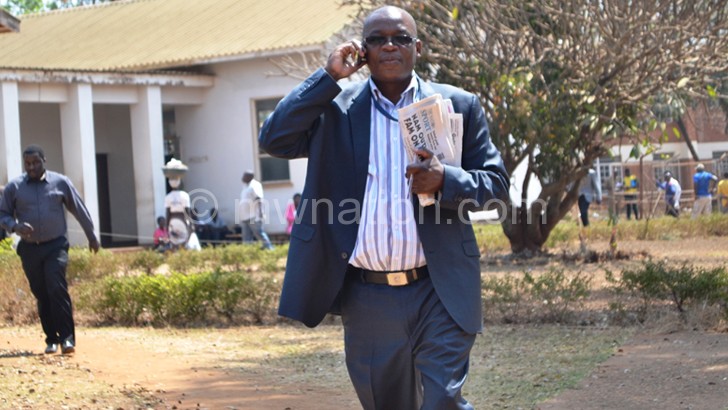Kalonga gets 7-year jail term
After waiting for at least two years, Cashgate convict Leonard Kalonga was yesterday slapped with a seven and a half-year jail term by the High Court in Lilongwe.
The court, on August 26 2015, convicted Kalonga, a former assistant director in the Ministry of Tourism on his own plea of guilty of stealing K3.7 billion.

In her ruling, Judge Fiona Mwale highlighted the leadership role played by the convict, saying a custodial sentence was befitting the crime committed, adding that a number of people are also serving in prison because of the actions and decisions of the convict.
Kalonga was given one-year jail term for defrauding government of K1 billion, two years for facilitating money laundering and seven and a half years for money laundering charges. The sentences will run concurrently.
Kalonga could have received a total of nine years in jail, but the sentence was reduced for being cooperative as a State witness in other Cashgate-related cases.
The court also heard that Kalonga surrendered to the State some of his property, including two houses in Kawale valued at K19 million, a Range Rover, a Mercedes Benz and two Toyota Corollas.
The convict laundered K520 million where he facilitated, abetted and aided acquisition of six Scania Marcopolo buses on alleged instruction from then Ministry of Finance budget director Paul Mphwiyo, which were proceeds of serious crime between April and September 2013.
The judge observed in her ruling: “The money was not earmarked for purchase of the buses and government must have had other pressing issues at the time. But credit must be given to the convict for making the job easier to trace the property.”
Kalonga looked calm throughout the sentencing while sipping water from a bottle.
His lawyer Emmanuel Theu refused to comment on the sentence, saying he needed to consult his client first.
But Director of Public Prosecutions (DPP) Mary Kachale hailed the ruling, saying the sentence reflects the gravity of the offence.
She said: “People in suits and in high places are very smart, educated people but have become so smart in criminality. We are satisfied that finally justice has been done.”
In an earlier interview, Kachale explained that Kalonga has been what in legal language is called ‘cooperating defendant’ and the treatment, including the sentencing of such a defendant is not only a matter of local significance, but has a bearing on the country’s international obligations.
She cited article 37 of the United Nations (UN) Convention Against Corruption (UNCAC), to which Malawi is a signatory, saying under the article there is need for State parties to motivate those involved in crimes covered by the UNCAC to provide factual and useful information to investigative or prosecution law enforcement agencies, as a tool for fighting organised crime.
“One implementation requirement is legislation that adequately outlines the steps and processes to be followed in such arrangements. In Malawi, though we have Section 252A of the Criminal Procedure and Evidence Code, which brings plea bargain into our criminal justice system, the rules have not yet been promulgated. As a consequence, the case is ground-breaking hence sentencing duration must be understood in that general context,” said Kachale.





